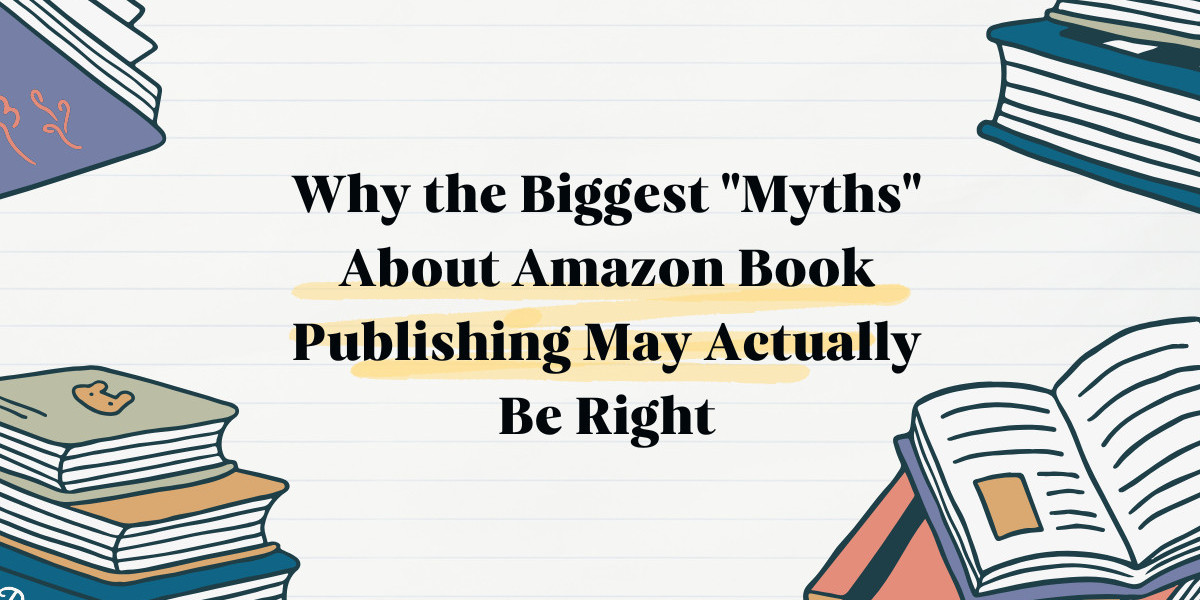Introduction
Amazon Book Publishing, particularly through Kindle Direct Publishing (KDP), has revolutionized the self-publishing industry. Aspiring authors now have access to tools that make publishing more accessible than ever. However, alongside this revolution, numerous myths about Amazon book publishing have circulated, leaving many authors confused or skeptical. Surprisingly, some of these myths may hold more truth than you think. Hiring an Amazon book specialist ensures your book stands out in a competitive marketplace. In this blog, we’ll explore common myths about Amazon book publishing, why they might be true, and how understanding these myths can help you navigate your publishing journey more effectively.
Myth #1: "Amazon Takes Too Much Control Over Your Work"
Truth Behind the Myth:
Many authors believe Amazon takes excessive control over their books, particularly when enrolling in programs like Kindle Unlimited (KU). While Amazon doesn’t own your content, enrolling in KU does impose restrictions. For example, exclusivity requirements prevent you from selling eBooks elsewhere, limiting your distribution options.
Why It Might Be True:
The exclusivity clause in KU means authors are entirely dependent on Amazon for their eBook sales. This can be risky if Amazon changes its policies or algorithms, which can drastically impact visibility and sales.
Myth #2: "You Can’t Make Money With Amazon Publishing"
Truth Behind the Myth:
The self-publishing world is competitive, and many authors struggle to make significant profits on Amazon. With millions of books available, standing out requires strategic marketing and consistent effort.
Why It Might Be True:
- Low Royalties for Certain Prices: Amazon's 35% royalty rate for books priced below $2.99 or above $9.99 limits profitability.
- Competition Saturation: With millions of titles, it's challenging to gain visibility without investing in advertising or having an established audience.
However, many successful authors prove that with the right strategy, it’s possible to earn a substantial income on Amazon.
Myth #3: "Amazon Favors Certain Genres Over Others"
Truth Behind the Myth:
Amazon’s algorithms do favor popular genres such as romance, mystery, and self-help because these genres tend to sell well. Authors in niche genres often struggle to gain traction on the platform.
Why It Might Be True:
Amazon's recommendation engine promotes books that perform well, creating a cycle where popular genres dominate visibility. If you're writing in a niche category, your book may require additional marketing efforts to reach its audience.
Myth #4: "Amazon Publishing Doesn’t Support Authors"
Truth Behind the Myth:
While Amazon provides tools for authors, such as KDP’s publishing interface, marketing is largely the author’s responsibility. There’s minimal direct support for promotion or audience building.
Why It Might Be True:
- Lack of Personal Guidance: Amazon doesn’t offer one-on-one support for authors.
- Reliance on Paid Ads: Amazon Advertising is often essential for visibility, but it comes with a cost that not all authors can afford.
Myth #5: "Only Established Authors Succeed on Amazon"
Truth Behind the Myth:
Breaking through as a new author is undoubtedly challenging, but it’s not impossible. Many authors have built successful careers starting from scratch on Amazon.
Why It Might Be True:
Established authors have:
- Loyal audiences who buy their books upon release.
- More resources for marketing and advertising.
However, persistence, quality writing, and strategic marketing can help new authors carve out their space on Amazon.
Myth #6: "Amazon Publishing is Just Self-Publishing With Extra Steps"
Truth Behind the Myth:
Amazon KDP offers tools that simplify self-publishing, but success requires more than just uploading a manuscript. Authors must manage cover design, formatting, and marketing.
Why It Might Be True:
Amazon doesn’t handle these elements for you. To truly succeed, you need to approach self-publishing as a business, which can feel overwhelming for some authors.
Myth #7: "Amazon's Algorithms Are Impossible to Beat"
Truth Behind the Myth:
Amazon’s ranking and recommendation algorithms are complex, prioritizing factors like sales velocity, reviews, and click-through rates. While they can feel opaque, understanding them is key to success.
Why It Might Be True:
The sheer number of variables makes it challenging for authors to predict or manipulate their book’s performance. However, learning how to optimize metadata, keywords, and pricing can significantly improve visibility.
Myth #8: "Amazon Publishing is the Only Option"
Truth Behind the Myth:
While Amazon dominates the market, numerous alternatives exist for authors, such as IngramSpark, Draft2Digital, and Smashwords.
Why It Might Be True:
Amazon’s reach and ease of use make it the go-to platform for many authors. However, exploring other options can provide additional revenue streams and expanded distribution.
Myth #9: "Amazon Will Promote Your Book for You"
Truth Behind the Myth:
Authors often assume Amazon will actively market their books, but this is a misconception. Amazon’s algorithms promote books based on performance, not the author's effort.
Why It Might Be True:
If your book doesn’t meet certain thresholds (sales, reviews, etc.), it’s unlikely to appear in recommendations or search results.
Myth #10: "Amazon Publishing Is a Quick Way to Get Rich"
Truth Behind the Myth:
Self-publishing on Amazon can be lucrative, but success typically requires time, effort, and investment in quality and marketing.
Why It Might Be True:
The “overnight success” stories often mask the months or years of hard work authors put into building their audience and refining their craft.
How to Succeed Despite the Myths
- Invest in Quality: Ensure your manuscript is well-edited and your cover is professionally designed.
- Understand Amazon’s Algorithms: Learn how to optimize your keywords, categories, and pricing to boost visibility.
- Leverage Marketing Tools: Use Amazon Advertising, social media, and email lists to promote your book.
- Explore Other Platforms: Don’t rely solely on Amazon; diversify your distribution to maximize your reach and revenue.
FAQs
- Can I publish on Amazon and other platforms simultaneously?
Yes, unless you enroll in Kindle Unlimited, which requires exclusivity for eBooks. Print books and audiobooks can be distributed widely.
- How much does Amazon pay authors?
Authors earn 35–70% royalties depending on the book's price and region. Pricing within $2.99–$9.99 qualifies for the 70% rate.
- Is it worth investing in Amazon Advertising?
Yes, for authors willing to invest in learning the platform. It can significantly increase visibility and sales if used effectively.
- Can niche books succeed on Amazon?
Yes, but they often require targeted marketing to reach the right audience.
- Do I need to hire professionals for editing and cover design?
While not mandatory, professional editing and cover design greatly enhance your book’s appeal and credibility.
- How do I get reviews for my book?
Start by reaching out to friends, family, and beta readers. Consider platforms like NetGalley to connect with reviewers.
- Is Amazon the best platform for first-time authors?
It’s a great starting point due to its ease of use and massive audience. However, exploring additional platforms is beneficial.
- What’s the best way to price my book?
Research similar titles in your genre. Pricing between $2.99 and $9.99 maximizes royalties on Amazon.
- Can I change my book after publishing on Amazon?
Yes, Amazon allows you to update your manuscript, cover, and metadata even after publishing.
- What’s the biggest mistake authors make on Amazon?
Rushing to publish without proper editing, formatting, or a marketing plan often leads to disappointing results.
Conclusion
While myths about Amazon book publishing abound, many contain elements of truth that authors must understand to succeed. By addressing the challenges behind these myths, you can better prepare yourself for the realities of self-publishing. Amazon remains a powerful tool for authors, but it’s not without its flaws. By combining strategic planning, quality work, and an understanding of alternative platforms, you can maximize your success in the ever-evolving world of book publishing. With Amazon hosting, you can easily manage and deploy applications in a secure cloud environment.



